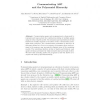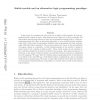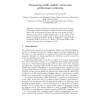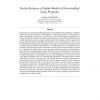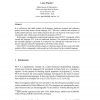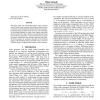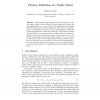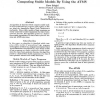236
click to vote
LPNMR
2011
Springer
14 years 5 months ago
2011
Springer
Communicating answer set programming is a framework to represent and reason about the combined knowledge of multiple agents using the idea of stable models. The semantics and expre...
142
click to vote
AI
2011
Springer
14 years 9 months ago
2011
Springer
The concept of a stable model provided a declarative semantics for Prolog programs with negation as failure and became a starting point for the development of answer set programmi...
142
click to vote
CORR
1998
Springer
15 years 1 months ago
1998
Springer
In this paper we reexamine the place and role of stable model semantics in logic programming and contrast it with a least Herbrand model approach to Horn programs. We demonstrate ...
115
click to vote
CORR
2002
Springer
15 years 1 months ago
2002
Springer
Abstract. We study algorithms for computing stable models of propositional logic programs and derive estimates on their worst-case performance that are asymptotically better than t...
148
click to vote
CORR
2004
Springer
15 years 1 months ago
2004
Springer
In this paper we analyze the relationship between cyclic definitions and consistency in GelfondLifschitz's answer sets semantics (initially defined as `stable model semantics...
120
click to vote
IANDC
2006
15 years 2 months ago
2006
It is well-known that stable models (as dI-domains, qualitative domains and coherence are not fully abstract for the language PCF. This fact is related to the existence of stable ...
129
click to vote
AMAI
2006
Springer
15 years 2 months ago
2006
Springer
The theorem on loop formulas due to Fangzhen Lin and Yuting Zhao shows how to turn a logic program into a propositional formula that describes the program's stable models. In...
102
click to vote
AMAI
2008
Springer
15 years 2 months ago
2008
Springer
The paper studies the relationship between logic programs with the stable model semantics and difference logic recently considered in the Satisfiability Modulo Theories framework....
107
click to vote
BIRTHDAY
2010
Springer
15 years 3 months ago
2010
Springer
Stable models of logic programs have been studied by many researchers, mainly because of their role in the foundations of answer set programming. This is a review of some of the de...
120
click to vote
AAAI
1990
15 years 3 months ago
1990
An algorithm is described which computes stable models of propositional logic programs with negation as failure using the Assumption Based Truth Maintenance mechanism. Since stabl...
